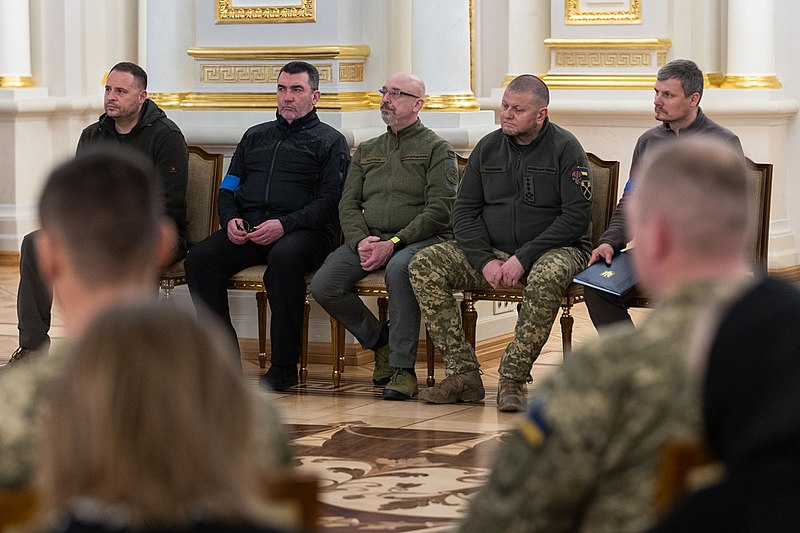The West and many other countries are answering Ukraine’s calls for more weapons and ammunition to help fight Russia for its unprovoked invasion. Ukraine’s defense minister reported over the weekend that the country has received Harpoon missiles and howitzers.
Ukrainian defense minister Oleksiy Reznikov said Saturday that Ukraine has begun receiving Harpoon anti-ship missiles from Denmark and self-propelled howitzers from the United States, adding that the new arms that were acquired would help Ukrainian forces resist Russia’s invasion.
“The coastal defense of our country will not only be strengthened by Harpoon missiles – they will be used by trained Ukrainian teams,” said Reznikov in a post shared on Facebook.
Reznikov said the Harpoon shore-to-ship missiles would be used alongside the Ukrainian Neptune missiles in its defense of the country’s coast including the port region of Odesa in the south. Reznikov also said the supplies of Harpoon missiles came from the cooperation of several countries, and the deliveries coming from Denmark were made “with the participation of our British friends.”
Ukraine’s defense chief also said the country has also received a range of heavy artillery, including US-made M109 self-propelled howitzers that will enable the Ukrainian military to strike targets from longer distances.
Following its invasion of Ukraine, Russia has also imposed a naval blockade of Ukrainian ports, blocking exports of Ukrainian grain. Moscow also used its Black Sea fleet to launch missile attacks on Ukraine, which has begun receiving aid from the West.
The incoming arms to Ukraine follow reports last month that members of the US military were training Ukrainian troops to use howitzer artillery and that the training was taking place outside Ukraine.
Top officials of the European Union met Monday for another attempt to come to an agreement on imposing sanctions on Russian oil before their leaders meet later in an effort to maintain a united front over the region’s response to the war.
In a new draft of summit conclusions, the bloc’s 27 leaders must agree that the next round of sanctions on Russia would target oil with a temporary exemption of crude that is delivered by pipeline, which ambassadors failed to come to an agreement on over the weekend.



 Norway Opens Corruption Probe Into Former PM and Nobel Committee Chair Thorbjoern Jagland Over Epstein Links
Norway Opens Corruption Probe Into Former PM and Nobel Committee Chair Thorbjoern Jagland Over Epstein Links  U.S. to Begin Paying UN Dues as Financial Crisis Spurs Push for Reforms
U.S. to Begin Paying UN Dues as Financial Crisis Spurs Push for Reforms  U.S. Lawmakers to Review Unredacted Jeffrey Epstein DOJ Files Starting Monday
U.S. Lawmakers to Review Unredacted Jeffrey Epstein DOJ Files Starting Monday  Netanyahu to Meet Trump in Washington as Iran Nuclear Talks Intensify
Netanyahu to Meet Trump in Washington as Iran Nuclear Talks Intensify  China Warns US Arms Sales to Taiwan Could Disrupt Trump’s Planned Visit
China Warns US Arms Sales to Taiwan Could Disrupt Trump’s Planned Visit  Trump Signs Executive Order Threatening 25% Tariffs on Countries Trading With Iran
Trump Signs Executive Order Threatening 25% Tariffs on Countries Trading With Iran  U.S. Announces Additional $6 Million in Humanitarian Aid to Cuba Amid Oil Sanctions and Fuel Shortages
U.S. Announces Additional $6 Million in Humanitarian Aid to Cuba Amid Oil Sanctions and Fuel Shortages  Missouri Judge Dismisses Lawsuit Challenging Starbucks’ Diversity and Inclusion Policies
Missouri Judge Dismisses Lawsuit Challenging Starbucks’ Diversity and Inclusion Policies  Trump Says “Very Good Talks” Underway on Russia-Ukraine War as Peace Efforts Continue
Trump Says “Very Good Talks” Underway on Russia-Ukraine War as Peace Efforts Continue  New York Legalizes Medical Aid in Dying for Terminally Ill Patients
New York Legalizes Medical Aid in Dying for Terminally Ill Patients  US Pushes Ukraine-Russia Peace Talks Before Summer Amid Escalating Attacks
US Pushes Ukraine-Russia Peace Talks Before Summer Amid Escalating Attacks  Trump Allows Commercial Fishing in Protected New England Waters
Trump Allows Commercial Fishing in Protected New England Waters  U.S.-India Trade Framework Signals Major Shift in Tariffs, Energy, and Supply Chains
U.S.-India Trade Framework Signals Major Shift in Tariffs, Energy, and Supply Chains  Trump Lifts 25% Tariff on Indian Goods in Strategic U.S.–India Trade and Energy Deal
Trump Lifts 25% Tariff on Indian Goods in Strategic U.S.–India Trade and Energy Deal  TrumpRx Website Launches to Offer Discounted Prescription Drugs for Cash-Paying Americans
TrumpRx Website Launches to Offer Discounted Prescription Drugs for Cash-Paying Americans  Trump Allegedly Sought Airport, Penn Station Renaming in Exchange for Hudson River Tunnel Funding
Trump Allegedly Sought Airport, Penn Station Renaming in Exchange for Hudson River Tunnel Funding  Iran–U.S. Nuclear Talks in Oman Face Major Hurdles Amid Rising Regional Tensions
Iran–U.S. Nuclear Talks in Oman Face Major Hurdles Amid Rising Regional Tensions 































